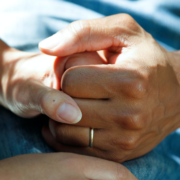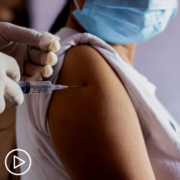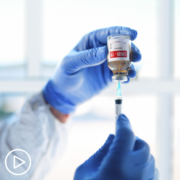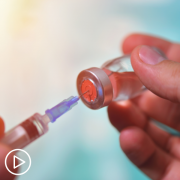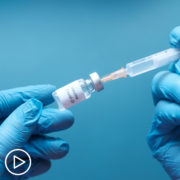How Cancer Patients Can Protect Themselves Against COVID-19 Variants
The arrival of several COVID-19 vaccines is giving the people of the world hope that we can eventually move past this deadly pandemic. However, while the future is promising, we are not out of the woods quite yet. As the primary virus is seeing a decline, many COVID variants are still spreading, and while doctors are still trying to understand these strains, caution is still required.
Cancer patients need to be extra vigilant during this time as the virus is dangerous for those with existing comorbidities. This fact doesn’t mean that you have to hide from society, but you do need to show caution as you go about your days during these still-dangerous times. To assist, we have compiled some information about situations that could increase the risk of contracting a COVID variant and how you can avoid exposure.
The Current COVID-19 Situation
While we are starting to see an end to the COVID-19 pandemic, we still have a ways to go, especially with several variants making their way around the world. Researchers are still learning about the severity of these variants, but in many cases, they are more transmissible, quicker to spread, and potentially undeterred by current vaccines. When it comes to the risks of COVID with cancer, it is not completely about the disease itself but about the weakened immune system that cancer creates.
Luckily, cancer patients can get the vaccine as long as components of that vaccine are not contraindicated or the patient doesn’t have specific allergies. The only real concern is that with a weakened immune system, the vaccines may be less effective, but it is better than no vaccine at all. It is also a smart idea for caregivers to get the vaccine so they can’t get the virus themselves and transmit it to the patient.
If cancer patients leave the house, they must follow the general safety guidelines that have been recommended throughout the duration of the coronavirus, including wearing masks when in public and staying socially distanced. It is also imperative to wash your hands often for 20 seconds or more at a time. Finally, clean and sanitize the surfaces in your home to avoid excess germs.
Clean Air is Key
Although it has been around for over a year, scientists are still trying to understand the true nature of COVID-19, including how it is transmitted and what factors make it as deadly as it has proven to be. During this research, experts have found a connection between the virus and hazardous air pollutants, and when the two combine, there is a noticeable 9% increase in the death rate. The issue is that particles in bad air can carry the disease, making it easier for people to breathe them in.
There are many signs that you may have poor air quality, including a build-up of dust in vents and corners, unpleasant odors, and an increased humidity around the home that has no explanation. A couple of the most common culprits of bad air quality are mold or asbestos. In both cases, you can have professionals come out to test and determine if they pose a danger, which is a smart idea as both harmful substances are often found in the walls where they can’t be seen. You can also bring in professionals to clean out the mold.
Asbestos is a chemical that was once incorporated into common building materials such as roofing and bathroom tiles. It is incredibly dangerous because once it is inhaled and makes contact with the lungs, prolonged exposure can lead to serious issues, including mesothelioma. If you live in an older home build before the 1980s, have it inspected, and if found, vacate immediately until proper renovations take place.
Needless to say, as a cancer patient, you must be aware of the dangers and make a concentrated effort to maintain clean air within the home. You can do this by placing air purifiers around the house and enforcing proper ventilation with open windows and exhaust fans in the bathrooms.
Avoid Excess Stress
There is no doubt that this is a troubling time in your life. Coming to terms with sickness, managing your medications, and dealing with your family all at once can be especially complicated, but as much as you can, it is important to try and stay as calm as possible and avoid excess stress during this time. The reason is that researchers are beginning to see a link between chronic stress and the severity of COVID-19.
When we get stressed, our bodies develop an increased level of the hormone cortisol. When someone is under a constant state of anxiety, the cortisol levels can remain high and lead to physical ailments, including rapid weight gain, bruising of the skin, and even diabetes. These conditions can affect your immune system and make you vulnerable to COVID-19 and other dangerous conditions and diseases.
While it may be easier said than done, stress management is essential during this challenging moment in your life. You can mitigate your stress by communicating with those you love and taking time to do activities you enjoy to keep your mind off of things. Also, focus on a healthy diet and get exercise when you can, as doing so will boost your mood and keep you busy.
It is also important to be careful of the supplements you take for stress relief and ensure that they don’t conflict with your cancer medications. For instance, many people take medications like Zantac to fight the gastrointestinal issues that can come from stress. However, Zantac has been found to create N-nitrosodimethylamine (NDMA) in the body, which is a dangerous carcinogen that has been known to lead to other forms of cancer. It is a smart idea to speak to your primary oncologist before trying other medications.
As someone on the journey of overcoming cancer, it is especially important to protect yourself against the dangers of COVID-19. By being aware of the risks and making smart decisions, you will get through this and see the light at the end of the tunnel.
Beau Peters is a creative professional with a lifetime of experience in service and care. As a manager, he’s learned a slew of tricks of the trade that he enjoys sharing with others who have the same passion and dedication that he brings to his work. When he is not writing, he enjoys reading and trying new things.

